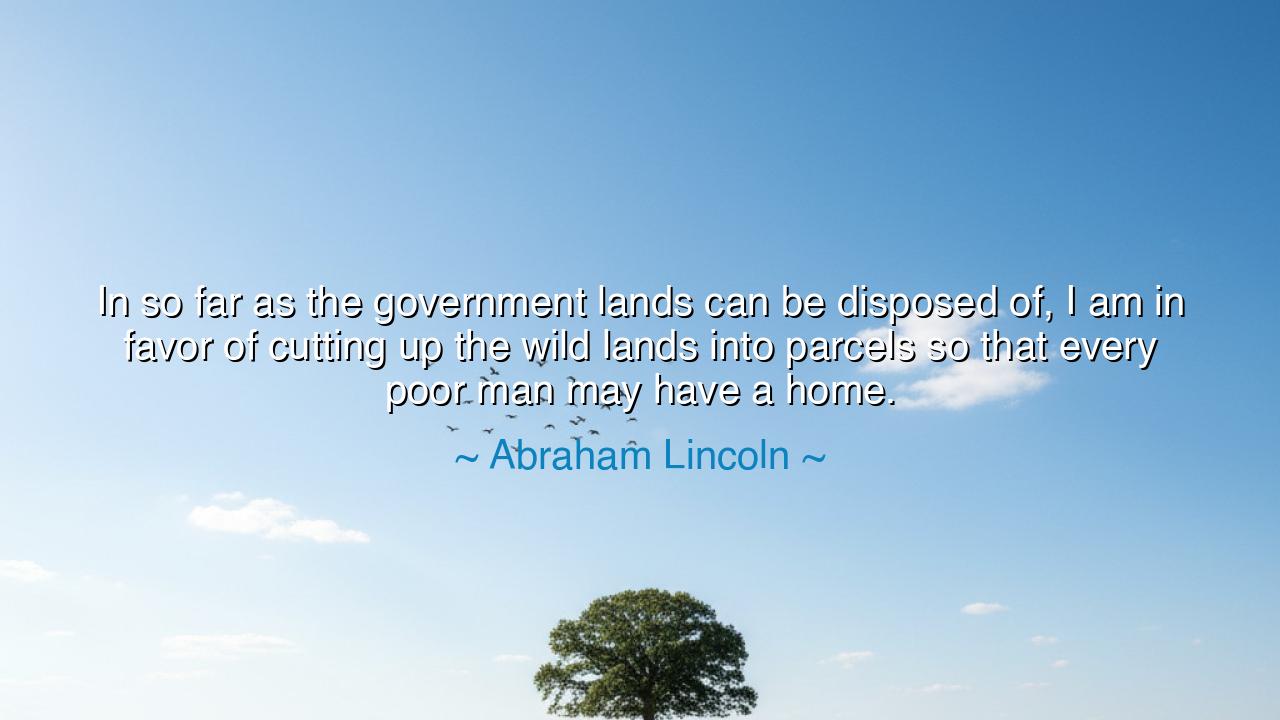
In so far as the government lands can be disposed of, I am in
In so far as the government lands can be disposed of, I am in favor of cutting up the wild lands into parcels so that every poor man may have a home.






The words of Abraham Lincoln, spoken with the plain dignity of a man who rose from humble soil, echo across the ages: “In so far as the government lands can be disposed of, I am in favor of cutting up the wild lands into parcels so that every poor man may have a home.” In this sentence lives the deep compassion and fierce justice that marked Lincoln’s spirit. It is not a statement of policy alone—it is a declaration of faith in the dignity of labor, the sacred right to ownership, and the belief that a nation’s greatness is built not by its wealthy few, but by its free and self-reliant many.
At its core, this quote reveals Lincoln’s lifelong devotion to the ideal of equality through opportunity. He understood that liberty without land, without work, without the means to stand independently, was only a shadow of freedom. To give every poor man a home was to give him not charity, but a chance—a chance to build, to cultivate, to rise by the strength of his own hands. In Lincoln’s mind, the republic would remain strong only if its people were anchored in ownership and responsibility, not bound by poverty or dependence. Thus, when he spoke of cutting up the “wild lands,” he spoke of transforming wilderness into community, and despair into hope.
The origin of this belief can be traced to Lincoln’s own life. Born into poverty on the rugged frontiers of Kentucky and Indiana, he knew the struggles of men who worked the land but did not own it. His early years were shaped by toil, isolation, and the dream of security that only a homestead could bring. When, as President, he signed the Homestead Act of 1862, this vision became law. That act opened millions of acres of government land to settlers, offering 160-acre plots to any citizen willing to cultivate them. It was one of the most democratic measures in human history—a living embodiment of Lincoln’s words. It gave the poor man a stake in the soil, and through that stake, a stake in the nation itself.
Consider the transformation that followed. In the decades after the Homestead Act, waves of farmers, immigrants, and freed slaves crossed the plains and prairies of America, building homes, planting crops, and founding towns. From barren wilderness arose the heartbeat of a new civilization. The prairie became breadbasket, and the settler’s cabin became a temple of freedom. Though many failed and the hardships were immense, the spirit of Lincoln’s dream endured. His belief that land ownership fosters character and citizenship proved true—those who had something to protect and nurture became defenders of the nation’s future.
But Lincoln’s wisdom extends far beyond his own time. His words remind us that justice is not equality of wealth, but equality of opportunity. To “cut up the wild lands” is to make space in society for those who have been left behind—to give each person a chance to sow and reap according to their labor. Every age, in its own way, must decide how to divide its “wild lands”—not just the physical soil, but the fields of education, technology, and opportunity. In our time, the “land” may be knowledge or access, yet the principle remains eternal: a free society must not hoard its resources in the hands of the few, but open paths for all who are willing to work and dream.
The emotional power of Lincoln’s quote lies in its moral humility. He does not call for revolution or confiscation, but for fairness guided by compassion. He knew that progress cannot come through envy or greed, but through empowerment. His vision was one of harmony, where the government acts as the steward of the people’s well-being, ensuring that the fruits of a nation’s abundance do not rot in the storehouses of privilege. The poor man, given land, becomes not a burden but a builder, a contributor to the common good.
The lesson, then, is both simple and profound: a nation is strongest when every man has a stake in its soil and its soul. In our own lives, we may not govern nations, but we can govern our communities, our families, our choices. We can practice Lincoln’s principle by creating opportunity rather than dependency—by lifting others not through gifts, but through empowerment. Let every person remember that freedom without foundation is fleeting, but when a man builds upon the earth with his own hands, he roots both himself and his posterity in something enduring.
Thus, the wisdom of Abraham Lincoln stands immortal: a government that serves its people must always seek to transform wilderness into possibility, to ensure that no one is left wandering without a home to claim or a dream to pursue. For as long as a poor man may find a place to stand, a seed to plant, and a hope to nurture, the republic will endure—strong, just, and ever advancing toward the light of true equality.






AAdministratorAdministrator
Welcome, honored guests. Please leave a comment, we will respond soon